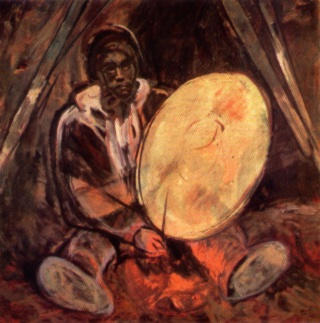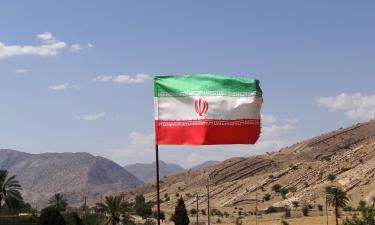The shaman story
 One Buryat shaman shares his views of the future
One Buryat shaman shares his views of the future
Valentin Khagdaev lives in the village Elantsi of Irkutsk district and works as…shaman. It is practically impossible to find Mr. Khagdaev at his own place. “M-A” correspondent for instance managed to catch the man after twelve miserable attempts. Thing is, the shaman conducts numerous ceremonies in various districts. With the help of Buryat songs and native musical instruments (drums, rattle, and several cult objects used in shamanism) the man calls out tengeri gods. These gods are known to help those who have health problems restore their health; they aid people to make right decisions and so on and so forth.
At times, shaman Khagdaev practices fortune telling using a lamb’s scapula, vodka, or simply cards. In fact, shamanism welcomes one’s will to look into the future. The man greets each new visitor with the sound of a bell. His wife Victoria treats new guests to a nice traditional meal.
“M-A” correspondent has had an interesting conversation with Valentin Khagdaev:
-Shamanism-is a religion of some sort, correct?
-Well, officially, there is no such religion as shamanism in our country. However, on the other hand, it is the belief system of many small populations (such as Nenets, Evenks, Chukci) on the Russian territory as well as on the territory of the former USSR. Muscovites in turn have really primitive notions of what shamanism is all about. They think we are just some aborigines with painted faces, who play drums in an attempt to ask gods for help when our house is on fire, instead of getting a bucket of water…
-Every god has a name, has helpers (saints in Christianity), has certain responsibilities: to punish sinners, encourage righteous men…
-The concept of “sin” is also present in shamanism. It is called “setre” in the Buryat language, or simply Taboo. One must respect the elderly, respect other religions, basically respect everyone; disrespect is considered similar to murder and theft. Our Almighty, however, does not punish anyone. He leaves us to think over our own misbehaviors.
Polygamy:
Sins in Shamanism are quite unique. For instance, polygamy is considered to be perfectly ok. The worse that could happen is to have widows and orphans in the village. Back in the old days, if a woman lost her husband, the elderly then had to find another man for her. If a child was left alone, he was immediately assigned to a new family. Nowadays, the tradition is lost. There are plenty lonely woman and orphans…
-If there is no punishment, no Heaven and no Hell, then what, from the point of view of shamanism supporters, awaits us on the “other side”?
-According to the Tibetan Book of the Dead, a man gets everything he believed in for all his life. Christians, while on a deathbed, meets with angels or demons, saints, apostles, Christ and God the father. Muslims meet prophet Muhammad; Budhists—goddess Taru, Buddha himself and departs into Nirvana. As for us shamanists, we see mother, father, relatives, friends, who died earlier.
-What is the cycle of life according to shamanism?
-A human can remain Human or he can degrade and end up as an animal that lacks mind and senses and is governed purely by his instincts. A man can also be “reborn” as a plant…In any way, each of us has a choice.
Healing power
Suddenly, as we were in the middle of a passionate discussion, someone knocked on the kitchen door. It was a student of his. While my conversation partner was absent, his wife Victoria told me how her husband heals people. At times, she says, those are absolutely hopeless people that seek shaman’s help. For instance, one eight-year-old boy from the neighboring village has been diagnosed with severe state of mental retardation. The kid had hard times studying. Valentin Khagdaev spent lots of time with the boy conducting more than a dozen rituals. It helped in theend! Actually, there are times when even a shaman is unable to help. In this case however, the boy must have had very strong support from the spirits of his ancestors.
As for Valentin himself, he avoids such discussions regarding his “success stories”. Personal success stories are taboo in shamanism.
-In your rituals you call for the ancestors, and this is considered the basis of the ceremony. In majority of religions, on the contrary, it is prohibited to worry spirits of the deceased, for they must rest in peace…
-We do not disturb them when we ask them for help; on the contrary, we acknowledge their power! Most of the time however there is no need to ask their help. Great ancestors (they are always present in every clan) are always there with us; they constantly advise us. Problem is, not everyone is capable of hearing them. That’s when they need a shaman. It is of utmost important to know your ancestors, to know one’s genealogy at least the past five generations. This is common in our villages. As for residents of big cities, they are often completely unaware of their ancestry.
-Tell me please, does a shaman possess the unique abilities from birth or is it possible to acquire such talents with age?
-Generally, such talents are being passed on from one generation to the next. However, not every generation is blessed with them; it happens only once in 300-400 years.
Back in the days, every village used to have its own shaman. Things are different today. That is why I could be considered to be the “last of the Mohicans”. Despite their political views (both of them were communists) my grandfather and grandmother always prayed to the shaman gods. At least a year, all members of the clan (more than a hundred people) would gather together at one huge table for a major family meting. One day, during one of such family gatherings an elderly man predicted that “our chalice would be divided into ix phalanges”. In our language, this means the coming of a new shaman. One of the major distinctions of a shaman, according to our teachings, is an additional bone in the body (an extra rib). This is indicative of supernatural powers; the sign of a shaman. I learned this fact from my mother. She gave birth to me after thirty years since the event. As you can see, I have six fingers on one hand: the six phalanges.
Drunkenness
Shamanism supporters have rather strange attitude towards drunkenness. Not only does the state of intoxication not condemned, it is highly encouraged. Take the so-called “burkhans” (relatively short pillars with colorful ribbons attached to them) for instance. These symbols are dedicated to our ancestors. When passing one of such “burkhans”, every person has to leave something be it a handkerchief, a coin or a candy) and afterwards drink a glass of vodka in the name of the gods. Since such pillars practically surround the village, many of local men have become inveterate drunkards.
Shaman Khagdaev actively advocates against such tradition.
-Valentin, you are a candidate of cultural sciences, you are currently working on your doctoral dissertation. How can shamanism go hand-in-hand with science?
-First of all, my dissertation still has a long way to go. I do not like to reveal my future plans. We could talk about it once it's done. As for science and shamanism, they work perfectly well together. My faith is a set of knowledge. When I heal people for instance, I use certain herbs, burn certain candles; this is known to relax one's nervous system. Also, I find acupuncture to be incredibly effective. At times, I also prescribe my patients some drugs from a drug store, needed to improve their immune system. There are also times when I find myself unable to help due to various reasons; then I advise my patient to seek professional medical help.
Victoria Kataeva
"Megapolis"
Subscribe to Pravda.Ru Telegram channel, Facebook, RSS!




